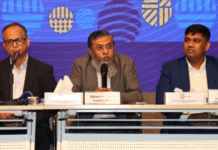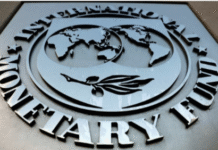The government’s long quest for overcoming gas crisis would finally be over next year when it hopes to bump up the supply by 37 percent, ridding on imports of liquefied natural gas, said the energy adviser yesterday.
“There will be no gas crisis from next year,” said Prime Minister’s Energy Affairs Adviser Tawfiq-e-Elahi Chowdhury yesterday at the third quarterly meeting of the Metropolitan Chamber of Comm-erce and Industry, Dhaka.
Some 500 million cubic feet of LNG would be imported everyday at the start of next year and another 500mmcfd added by the middle of 2018.
Following the gas import, the supply of gas will increase 37 percent — but so will the price of the utility.
Subsequently, the adviser urged the business community to take preparation accordingly.
“But I can assure you that the LNG price will be affordable and remain stable in the medium-term.”
Chowdhury said the government would sit with the business community and leading industrialists early next week to know about their demand for the primary fuel.
The country has been dogged by serious gas shortages for a long time now, crippling industries. It currently has a supply of about 2,700 mmcfd gas from various gas fields against the demand of 3,300 mmcfd.
In her address, MCCI President Nihad Kabir said the business community is faced with three issues: supply of credible electricity and gas, price stability and forecast of future energy prices.
“There is gas supply but the pressure is low. Similarly, the voltage of electricity is also low, which hampers the running of modern machines.”
She said the depletion of gas reserves is one of the biggest hurdles. “There is no denying that we need to undertake major explorations of hydrocarbon, and the sooner we discover some, the better for us.”
The dependence on coal-based plants for power generation has the catch that most of the coal would be imported. In that case, the shifting global coal prices can pose difficulties for the country.
“We would also have to be equipped with the proper infrastructure for importing huge amounts of coal and have an able managing team.”
The increase in energy supply could only be achieved if the transmission capacities also increase in the same pace. “This has not always been the case, resulting in supply bottlenecks in important commercial corridors.”
The noted lawyer said a great majority of the country’s plans are focusing on having LNG as the core of the energy supply.
“So, we have to remember that it is costly, and its introduction will lead to some price shock. The government would need to prepare the public for that beforehand.”
There is also a question of whether the country would become over-dependent on imported energy, the MCCI president said, adding that any instability in the supply chain and any rise in global prices may pose challenges.
Chowdhury said the price of LNG is soft globally and the government hopes that it would continue in the medium-term, helping it limit the increase in the gas price once the imported fuel starts to add to the network.
“Maybe some support from the budget will be required, but ultimately, the industries would have to prepare to bear the cost.”
The adviser urged the industries to start seriously focusing on energy efficiency and conservation as modern technologies and processes help use 90 percent of the energy supplies.
He said Bangladesh would start importing another 500 megawatts of electricity from India next year. The neighbouring country already exports more than 600MW of electricity.
The energy adviser said the government is looking for investment to the tune of $30 billion in the power sector for the next five to six years.
“We are looking forward to the private sector taking half of the responsibility as it has been doing for all these years,” he added.
In the absence of adequate gas supplies, industries rely on diesel- and furnace oil run-generators, said Tapan Chowdhury, a former president of the chamber.
“But for some reasons the government has imposed duty on furnace oil. I don’t know if there is any other use of residual fuel oil other than running small power plants,” he added
In reply, the energy adviser said the government is looking to put a mechanism in place such that diesel and furnace oil imported for power plants could be given duty-free facility.
Asif Ibrahim, a former president of the Dhaka Chamber of Commerce and Industry, called for a policy so that LNG price remains stable for at least three to five years to help businesses manage costs.
Bangladesh has displayed stellar success in solar home system, but the achievement has not been replicated in solar mini-grids and rooftop systems for lack of incentives for the private sector, said Munawar Misbah Moin, group director of Rahimafrooz.
Syed Nasim Manzur, also a former president of the MCCI, called on the government to ensure stable energy supply. “Give us gas and electricity and we will take the country forward,” he said.
Anis A Khan, managing director of Mutual Trust Bank, said low-cost funds from development partners are available for green and renewable energy and energy-efficiency projects.









